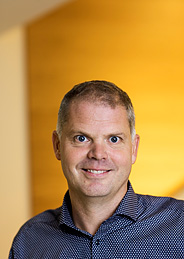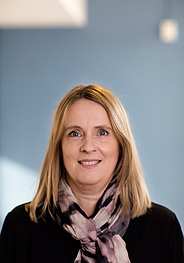- Home
- News and events
- Find news
- Two Wallenberg Scholars for University of Gothenburg
Two Wallenberg Scholars for University of Gothenburg
The Knut and Alice Wallenberg Foundation has appointed Professors Fredrik Bäckhed and Maria Falkenberg of the University of Gothenburg as Wallenberg Scholars in 2019. This program was created to give top researchers scope to carry out long-term work. The research grant for each Scholar is SEK 18 million.
This is the fifth time the Wallenberg Foundations have announced Wallenberg Scholar appointments. The Foundations’ aim with this program is to give researchers the opportunity for free, curiosity-driven and ambitious research. The grants approved run for five years, after which they may be extended, The program began in 2009 and, with this year’s appointment of 22 new Wallenberg Scholars, there are now 63 working at Sweden’s universities.
Two of the new Scholars are Fredrik Bäckhed and Maria Falkenberg, both established researchers at Sahlgrenska Academy, University of Gothenburg.
Importance of how diabetes treatment affects intestines
 Fredrik Bäckhed, Professor of Molecular Medicine, has previously demonstrated that there is a connection between the gut microbiota and the development of obesity, type 2 diabetes and related diseases. There several treatments for type 2 diabetes, where the first is the drug metformin and, but also bariatric surgery, which lead to weight loss, improves diabetes even before weight loss.
Fredrik Bäckhed, Professor of Molecular Medicine, has previously demonstrated that there is a connection between the gut microbiota and the development of obesity, type 2 diabetes and related diseases. There several treatments for type 2 diabetes, where the first is the drug metformin and, but also bariatric surgery, which lead to weight loss, improves diabetes even before weight loss.
”Both methods affect the gut microbiota, but the underlying mechanisms for how an altered microbiota contributes to the effects of treatment is still limited. With my research team, I want to explore these plausible connections,” Bäckhed says.
The group’s work is based on the hypothesis that both forms of treatment affect the intestines in a similar way, and that an altered bacterial environment can explain both positive and negative effects.
Bäckhed’s team are therefore planning to explore how the gut microbiota contributes to the effects of treatment with metformin. They also want to investigate how gastric sleeve and gastric bypass, the most common surgical interventions for obesity, affect the microbiota. Both these operations reduce the size of the stomach, but in gastric bypass the intestines are reconnected to divert food, so that it bypasses large parts of the stomach and the upper part of the small intestine.
A further hypothesis is that metformin and bariatric surgery affect the gut microbiota similarly, and the research group will therefore investigate whether the changes they cause contribute to the antidiabetic effects of the therapies. Finally, they will analyse how the intestinal mucous membrane reacts to these treatments and whether the gut microbiota is influential.
“First of all, this represents great recognition for the research group’s work in this area. Second, getting this long-term, large-scale support for our research means that we can devote even greater efforts to clarify how the gut microbiota is influenced by, and can influence, the effect of these treatments,” Bäckhed says.
Importance of cell powerhouses for disease
 To the general public, a mitochondrion is a fairly unknown part of the cell. However, being essential to human life because it produces the cell’s fuel, it has been dubbed “the cell’s powerhouse”. The mitochondrion has its own DNA that is entirely separate from the other genetic material in the cell.
To the general public, a mitochondrion is a fairly unknown part of the cell. However, being essential to human life because it produces the cell’s fuel, it has been dubbed “the cell’s powerhouse”. The mitochondrion has its own DNA that is entirely separate from the other genetic material in the cell.
If a child is born with damage to the mitochondrial DNA, severe diseases may result. Research has also shown that damaged mitochondrial DNA is connected with ordinary aging and several age-related diseases. Disrupted mitochondrial function may also be connected with common diseases, such as diabetes and Parkinson’s.
Maria Falkenberg, Professor of Biomedical Laboratory Science, studies how various forms of damage to this specific DNA arise and how they can be reduced. With her research group, she is studying how mitochondrial DNA is replicated and how this process is regulated.
”We wanted to find out what determines the number of copies of mitochondrial DNA in a cell, and why damage appears to cluster in certain places, so that symptoms may vary widely among individuals, and even between tissues in a single person,” Falkenberg says.
In the long term, these studies may play a part in development of new drugs, such as those targeting the diseases that may arise because of damage to mitochondrial DNA. Second, they may lead to improvements in other medicines that have the unwanted side-effect of damaging mitochondrial DNA and can thus give rise to new diseases.
”It’s a fantastic feeling. This grant means that my colleagues and I will be able to continue focusing on important, long-term issues. We can start new, risky projects that we wouldn’t otherwise have dared to tackle,” Falkenberg says.
More information about the research
Fredrik Bäckhed, email: fredrik.backhed@gu.se
Maria Falkenberg, email: maria.falkenberg@medkem.gu.se
All Wallenberg Scholars at the University of Gothenburg
- 2019 Fredrik Bäckhed, Professor of Molecular Medicine
- 2019 Maria Falkenberg, Professor of Biomedical Laboratory Science
- 2012 Thierry Coquand, Professor of Computer Science and Engineering
- 2012 Richard Neutze, Professor of Biochemistry
- 2012 Patrik Rorsman, Professor of Physiology
- 2011 Andrew Ewing, Professor of Analytical Chemistry
- 2009 Thomas Nyström, Professor of Microbiology
- 2009 Bo Rothstein, Professor of Political Science
Read more about Wallenberg Scholars
PHOTOS: Johan Wingborg/GU